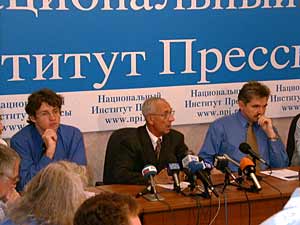
New Managing Director for Bellona Norway
The Board of the Bellona Foundation has appointed former Minister of Climate and the Environment Sveinung Rotevatn as Managing Director of Bellona No...
News

Publish date: August 1, 2000
Written by: Igor Kudrik
News
Displaying a gripping tenacity the Russian Prosecutor Generals Office has called on the Full Presidium of the Russian Supreme Court to review the acquittal of Bellonas employee and former navy captain Aleksandr Nikitin on high treason charges. The hearing of the appeal will start in Moscow on August 2 and will last for about two hours followed by the verdict announcement.
The Prosecutor Generals Office appealed Nikitins acquittal on May 30, but the defence team was alerted only on July 19. The ground for the appeal is mildly speaking weird. The prosecutors say they should be granted another chance to reinvestigate the Nikitin case in order to remedy the rights of the retired officer which were violated the first time around.
At the press conference the day before the scheduled court hearing Nikitins chief defender Yury Schmidt would not disguise his outrage over the prosecutors decision.
This is so cynical to set their prosecutors mistakes committed during the investigation as a ground for returning case for additional investigation, Yury Schmidt said to Bellona Web.
Schmidt also stressed that the prosecutor in the case, who was responsible for ensuring that no violations were committed during the investigation, had never bothered to straiten up the Russian Security Police investigators. The prosecutors showed concern over Nikitins rights only when two courts acquitted him of all charges, said Schmidt.
The whole thing seemed to be over a couple of months ago, Nikitin said at the press conference today. Nikitin was informed of the prosecutors move while he was touring the United States trying to draw attention of the West to the issues of decaying Russian nuclear submarine fleet and a wave of harassment launched by the Russian authorities against environmental NGOs. He rushed back to Russia to start preparations for the new trial having likely disappointed the prosecutors. Should he stay abroad, they would have surely pointed at the fact the Nikitin was hiding from the justice feeling guilty.
Bellonas legal advisor, Jon Gauslaa, said at the press conference that Nikitin filed complaint to the European Court of Human Rights in Strasbourg in July 1999. The Prosecutor Generals appeal is yet another move to reinforce the complaint and if the Presidium of the Supreme Court accepts the appeal, the only option for Nikitin would be to remedy his rights in Strasbourg.
Luckily the decision on this case will be reached by the Supreme Court judges and not by the prosecutors, said Gauslaa. The prosecutors seem still to be living in the USSR.
Aleksandr Nikitin was charged with high treason and divulging of state secrets for co-authoring Bellonas report on radiation hazards in the Russian Northern Fleet. In December 1999, St. Petersburg City Court acquitted Nikitin of all charges. The acquittal was upheld by the Russian Supreme Court in April 2000.

The Board of the Bellona Foundation has appointed former Minister of Climate and the Environment Sveinung Rotevatn as Managing Director of Bellona No...

Økokrim, Norway’s authority for investigating and prosecuting economic and environmental crime, has imposed a record fine on Equinor following a comp...

Our op-ed originally appeared in The Moscow Times. For more than three decades, Russia has been burdened with the remains of the Soviet ...

The United Nation’s COP30 global climate negotiations in Belém, Brazil ended this weekend with a watered-down resolution that failed to halt deforest...